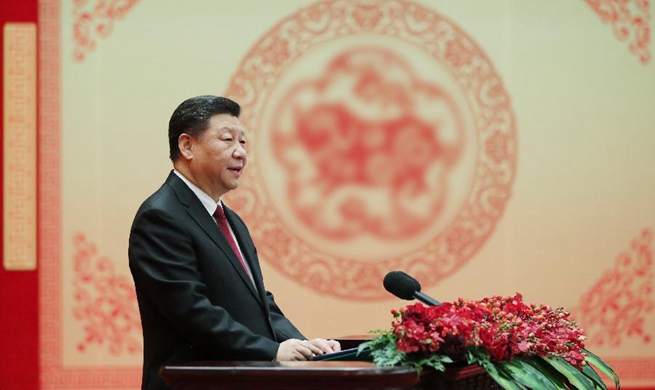by Murad Abdo
ADEN, Yemen, Feb. 8 (Xinhua) -- Representatives of the Saudi-backed Yemeni government left on Friday the Red Sea port city of Hodeidah following a series of meetings held with the Houthi delegation and the head of the United Nations cease-fire monitoring team, a government official told Xinhua.
The government representatives and their counterparts of the Houthi group at the joint Redeployment Coordination Committee (RCC) failed to reach a common ground for implementing Stockholm's agreement about the situation in Hodeidah province, the government source said on condition of anonymity.
"The Houthi representatives created new odds and refused to engage in discussions about the mechanisms for implementing the ceasefire deal declared in Sweden," the government source said.
He said that the representatives of the Saudi-backed Yemeni government left Hodeidah and headed back to Aden province without determining a specific appointment for the upcoming talks with the new retired Danish General Michael Lollesgaard, head of the UN observers in Hodeidah.
The government source held the Iranian-backed Houthis the full responsibility for leading the UN-backed talks regarding the implementation of Hodeidah's agreement into failure.
Meanwhile, the Houthi-affiliated Masirah television network reported that warplanes of the Saudi Arabia-led coalition hovered over Hodeidah's airspace for hours without carrying out airstrikes.
Heavy artillery shelling was carried out by the pro-government forces against the airport of Hodeidah despite the ceasefire agreement, but no casualties reported, it added.
Earlier in the day, Anwar Gargash, minister of state for foreign affairs of the United Arab Emirates (UAE), said in Twitter that the UN's plea for access to the Red Sea grain stores in Hodeidah illustrated that "the Houthis are the real impediment to peace in Yemen."
The UAE minister said that "the Stockholm Agreement offers us a unique opportunity to end the war in Yemen. Nonetheless, the Houthis are working hard to undermine this opportunity by their obstinate disregard to their commitments. We have to save the prospects for peace."
Gargash noted "it is vital that the international community support the Stockholm Agreement at this juncture. The way forward is to implement the Houthi withdrawal from the ports and Hodeidah city. The militia is dragging its feet and threatening the overall prospects for peace."
On Thursday, the UN spokesman Stephane Dujarric said that Yemen's warring parties have reached "a preliminary compromise" on demilitarizing the crucial Red Sea port of Hodeidah and opening humanitarian corridors for the famine-threatened country.
In discussions facilitated by RCC chaired by Michael Lollesgaard, the parties worked together constructively to resolve outstanding issues related to the mutual redeployment of forces and the opening of humanitarian corridors, said the spokesman.
The talks, which gathered representatives of Ansar Allah, the formal name for the rebel Houthis, and representatives of the Yemeni government, were held aboard a UN-chartered ship berthed in the Port of Hodeidah.
The conflict in Yemen started in 2014 when the Houthi rebels overtook the capital Sanaa and forced the government into exile in Saudi Arabia. Since 2015, a Saudi-led coalition, backing the government, has been fighting the Houthis.
The security situation was further exacerbated after the coalition launched in June 2018 an operation to retake rebel-held Hodeidah, a strategic port city that had been handling some 70 percent of Yemen's imports of food.
The fighting has spawned the world's worst humanitarian crisis and brought the poorest Arab country to the brink of famine.
Under the UN auspice, the warring parties reached a deal in Sweden in December 2018, which included a cease-fire in Hodeidah and the formation of the RCC to monitor the withdrawal of troops by both government and Houthis in the area.
Shortly afterward, the UN Security Council (UNSC) authorized an advance team to monitor and support the implementation of the deal for 30 days.
Earlier in January, the UNSC adopted a resolution to establish a UN political mission for an initial period of six months to support the Hodeidah agreement.

















